Overview: Nemex Resources Ltd (“Nemex”, “the Company”) is an Australian company with technology and mineral resource assets. It is presently focused on biometric security through a strategic investment in Wavefront Biometrics Technologies Pty Ltd (“WBT”). WBT is developing a new, disruptive biometric recognition technology utilising the eye’s corneal surface. The market for biometric recognition technologies is estimated to be worth US$7billion.
![]()
Catalysts: Laboratory testing indicates WBT’s corneal recognition technology could deliver superior performance to existing commercial biometric benchmarks, the leader of which is iris recognition. Internal validation of the technology is expected to conclude in Q1 2015 and provide the basis of licensing discussions across multiple industries.
Hurdles: WBT’s technology has yet to be independently appraised and there is no guarantee lab performance can be replicated in a commercial setting. Further development of the technology requires additional capital. Partial nature of Nemex’s equity in the technology may impede its capacity to attract fair value in its share price.
Investment View: Nemex offers speculative exposure to the evolving global biometric security markets. We are attracted to the superior performance indicated by lab testing of WBT’s technology, yet recognise that independent validation stands ahead as a major value determinant. On a success case basis, our valuation of $0.09/share represents an 87 percent premium to a recent trade. Whilst upcoming option expiries could influence near-term performance, we initiate coverage with a ‘speculative buy’ recommendation in light of the Company’s growth opportunity.
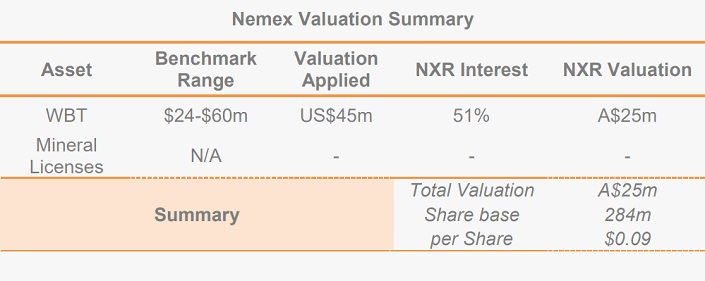
Nemex Resources Limited (“Nemex”, “the Company”) is an Australian-based company with technology and mineral resource assets. Its present focus is biometric security technologies via a conditional earn-in agreement for a 51% interest in Wavefront Biometric Technologies Pty Ltd (“WBT”).
The Company’s mineral interests encompass exploration licenses in West Africa and Australia.
Biometric focus from April 2014
Nemex listed on the Australian Securities Exchange in 2011 raising $6m for use in mineral exploration in Western Africa and Australia. Issued capital currently stands at approximately $9.6 million, or 5c/share. Since signing an agreement with WBT in April 2014, issued capital has increased by $1.3m, or 1c/share.
In April 2014, Nemex secured a conditional agreement to invest in WBT, a private Australian Company developing biometric security systems. WBT was incorporated in 2007 for the purposes of commercializing research developed by its founders.
Nemex has subsequently invested $1.325million in two tranches for a 30 percent interest in WBT. The Company has options to increase its interest in WBT up to 51% by investing a further $2.75million in two tranches, detailed in Table 1 below.
Agreement to acquire 51 percent of WBT at $4million pre-money valuation
WBT’s primary asset is intellectual property surrounding a biometric recognition technology utilising the corneal topography within a person’s eye. The technology is known as Corneal Specular Reflex Authentication’ of identity or ‘CSRA’
Patents covering the CSRA technology have been granted, for which potential commercial applications include personal identity authentication in several large markets.
Prior to Nemex’s initial investment, approximately $800,000 was spent developing the technology.

Identity theft is the fastest growing crime in the US1. During 2013, unauthorised abduction of utilities and mobile phone accounts nearly tripled2. With biometric methods of identity verification providing a source of mitigation against these crimes, demand for biometric technologies is forecast to rise from $7billion in 2012 to $15billion in 2015, according to Biometrics Research Group.
Biometrics can mitigate the fastest growing crime in US
Whilst biometric identification methods are not new, technological enhancements are now broadening their application, particularly at the consumer level. Laptops include fingerprint scanners and more recently, fingerprint sensors have been integrated into select smartphones.
Currently, there are a number of technologies on the market that implement biometric authentication. Fingerprint and voice recognition were amongst the first to be commercialised with the advent of computing technology in the 1970s. Iris and facial recognition were second-generation technologies developed in the 1990s, whilst vein recognition represents an emerging system currently in the process of being commercialised.
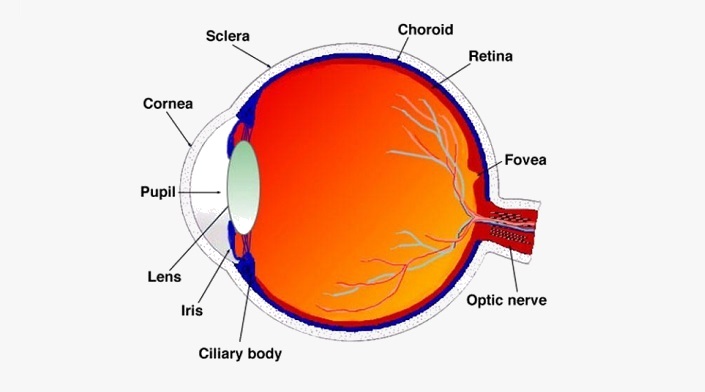
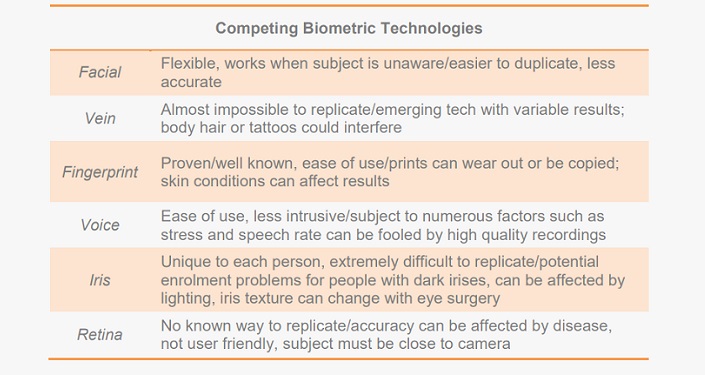
Iris technology delivers the highest accuracy amongst commercially available biometric technologies
Also at the emerging stages, WBT’s CSRA technology represents the third generation of eye-based biometric recognition. The technology is based on research by WBT’s founders recognising that within the eye, corneal topography is unique to each individual. By measuring the pattern of light reflected off the eye’s corneal surface, CSRA technology allows this unique trait to play a role in identity recognition.
There is a distinct trade-off between accuracy and user convenience with existing biometric recognition systems. Iris recognition systems developed in the late 1990s presently deliver the highest commercial standards in terms of accuracy, but rely on near-infrared light sources and suffer limitations in their application for persons with dark irises, eye conditions or experiencing intoxication. Iris recognition systems are also at risk of compromise if presented with iris ‘replica’s’.
CSRA lab performance superior to iris benchmark
The CSRA technology aims to at least meet the accuracy standards of iris recognition, but overcome existing limitations. CSRA has no enrolment issues and a very low error rate. CSRA can be used in various light conditions as it uses an independent light source for verification. It relies on contour of the cornea rather than colour or external appearance, and is not impacted by the use of contact lenses.
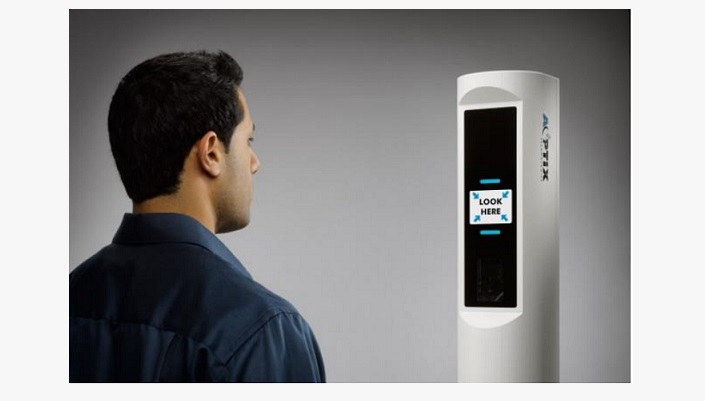
Intrinsic within the technology is a ‘reliable liveness’ test, which significantly enhances its security levels. Reliable liveness testing is required to defeat fraudulent ‘replay attacks’ where identity data is stolen and then used fraudulently as means of authentication. Attempts to ‘replicate’ a person’s corneal reading that is registered in the CSRA system are therefore rejected, rendering stolen biometric data useless.
To date, WBT’s development focus has been proving the concept behind the CSRA technology, developing supporting prototype hardware, and securing relevant Intellectual Property (IP) protections.
Prior to Nemex’s investment, WBT expended $150,000 on patenting and $650,000 developing the concept in a laboratory setting. Laboratory testing indicated the technology could deliver superior levels of accuracy to existing commercial iris recognition standards.
The technology’s capability was initially demonstrated using a static, desktop unit. Subsequent to Nemex’s investment, potential for mobile applications of the technology have been demonstrated. Internal appraisals of its accuracy in ‘miniature’ form are expected to conclude in Q1 2015, after which independent validation of the technology will be sought. Validation is expected to require three months.
US Patent secured May 2014
Prior to opening its technology for external validation, WBT has sought international patents to protect its IP. A US patent for biometric authentication using the eye was secured in May 2014 and another related patent is pending. An Australian patent application was accepted in September 2014, whilst filed applications in Europe, Canada, and Japan remain pending. Granted patents provide their holder exclusive rights to exploit technology for a period of 20 years.
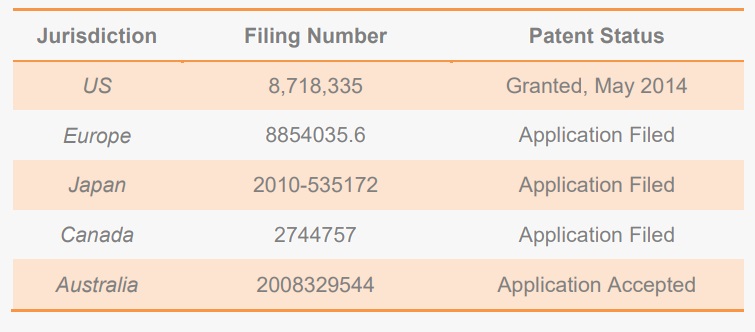
Licensing partners sought to drive commercialisation
WBT’s subsequent commercialisation strategy is focused on licensing the technology to partners across multiple industries, utilising two product offerings. A static ‘desktop’ offering is envisaged for medium/high security, low traffic facilities, aircraft, vessels, plant, and weapons systems. A ‘mobile’ mode is envisaged for individuals to authenticate their identities for banking, business, law enforcement, border control, patient/doctor interactions.
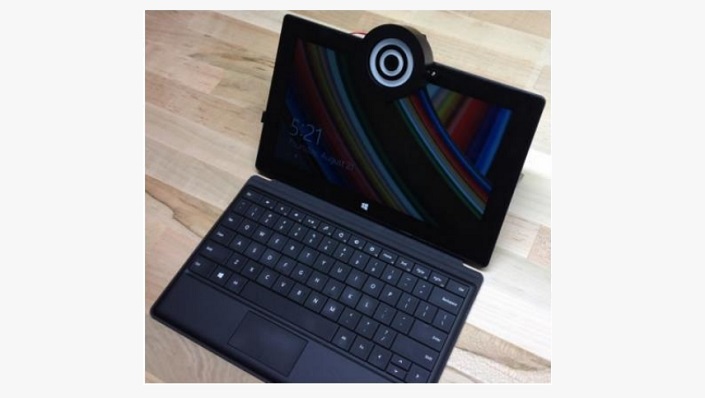
WBT plans on commencing partnership discussions in Q1 2015 following completion of internal performance appraisals. Its initial focus will be platform/device vendors, mobile device management vendors, and defence and physical security contractors.
Given the CSRA technology still requires commercial validation outside of a laboratory setting, the most relevant indication of its market potential is provided by transactions involving similar, yet commercially available biometric technologies.
Commercialised biometric technology companies valued at 2x – 5x revenue
Cumulative transaction values involving commercial biometric technologies over the past four years have neared $2billion. Amongst the benchmarks below, targets with eye-based technologies have commanded the highest revenues and market capitalisations. Overall, targets have been acquired for between 2x to 5x revenue.
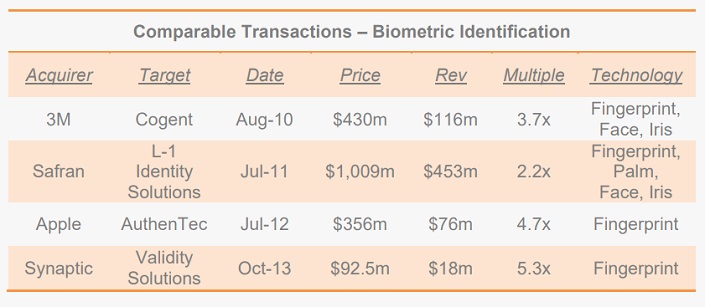
Nemex was originally incorporated in September 2010 to acquire, explore and develop iron ore and other mineral projects in West Africa and Australia. We estimate the Company committed ~$8million toward acquiring and developing its mineral resource portfolio, however subsequent deterioration in market and operating conditions have prompted a review of the portfolio. Nemex secured an agreement to divest a series of Cote d’Ivore mineral exploration licenses for $200,000 in September 2014. The Company retains its Télimélé Iron Project in Guinea, and the Woodley Iron Project, Western Australia.
Minerals portfolio under review
Télimélé Iron Project, Guinea
The Télimélé direct shipping ore (DSO) iron project is located in west Guinea, 110km from the coast. Exploration to date has identified an Inferred Resource of 258Million tonnes (Mt) at 37.3% Fe at the Boulere Prospect, which includes 16.7Mt at 55.1% Fe.
Development challenged by market and operating conditions
During the fiscal year 2014, activities at the project focused on generating and securing funding for a fully-costed, two-stage pre-development plan including drilling additional T1 mineralisation and completing a Bankable Feasibility Study. The decline in iron ore prices has hampered the Company’s ability to secure funding for future development. Additionally, fieldwork has been restricted in the second half of the fiscal year due to the spread of the Ebola virus in Guinea and the onset of the wet season.
Woodley Iron Project, Western Australia
Woodley is located 600km north-east of Perth, Western Australia and covers an area of 420sq km. The project is presently absent of defined resources. In March 2012, Nemex had entered into a joint venture agreement with GWR Group (formerly known as Golden West Resources Ltd) for the Woodley project. Under this agreement, GWR Group can earn up to an 85 per cent interest in the project, with Nemex free carried to completion of a Bankable Feasibility Study. During fiscal year 2014, GWR Group completed additionally geological mapping and exploration of the site.
Nemex does not generate any revenues from operations as its shareholding in WBT and other mineral licenses are all development-stage assets.
The Company is therefore reliant on external capital to finance operations, which to date it has sourced via equity offerings, and asset disposals. Issued capital presently stands at $9.6million, of which $1.3m has been raised since the announced agreement with WBT in April.
During September 2014, the Company sold its mineral interests in Côte d’lvoire for $200,000 in cash. At 31 October 2014 Nemex had cash of approximately $750,000.
Dec 14 options tranche could provide funding to support WBT earn in
A further $2.75million is required to increase its interest in WBT from current levels of 30 per cent to 51 per cent as per the earn in agreement. A series of 58.6million options are due to expire in December 2014 with a strike price of $0.05/share. Exercise of the entire tranche would raise $2.9million, sufficient to complete Nemex’s earn in requirements.
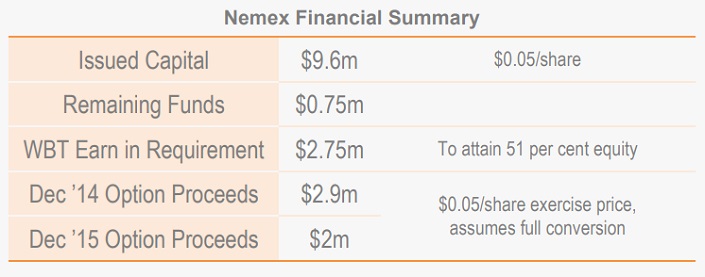
Nemex Resources investment appeal rests in near term commercialisation of WBT’s technology assets. We have therefore limited our appraisal of the Company’s shares to its equity holding in WBT.
Valuation limited to WBT shareholding
The existing agreement between Nemex Resources and WBT values WBT at ~$8million, post-investment. We have considered the potential future worth of WBT utilising a comparables approach.
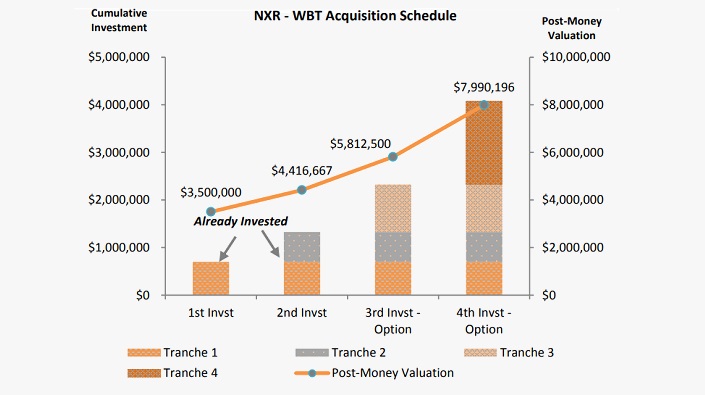
There is presently a scarcity of listed comparables developing biometric technologies, and transactions involving pre-commercial biometric assets. Therefore in conducting our valuation, we have broadened our universe to include transactions involving digital security technologies.
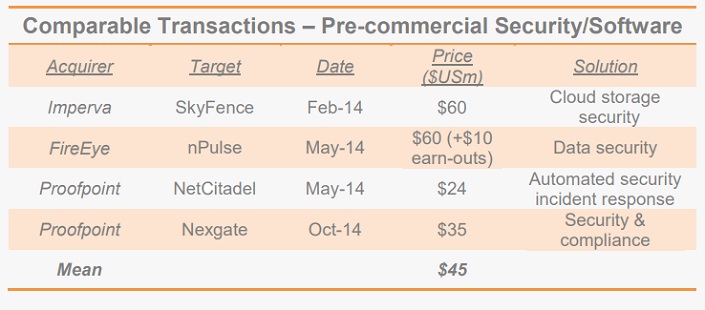
The comparable benchmarks attract valuations ranging from US$24million to US$60million, with a mid point of US$45million. After considering WBT’s development status relative to these benchmarks, we have applied a mid point valuation of US$45million for WBT on a 100% basis.
Benchmark median value US$45million
Assuming Nemex executes its remaining investment tranches into WBT and that future options expiries at $0.05/share provides the bulk of funding, we value the Company’s interest in WBT to be A$25million, or $0.09/share.
Valuation $0.09/share
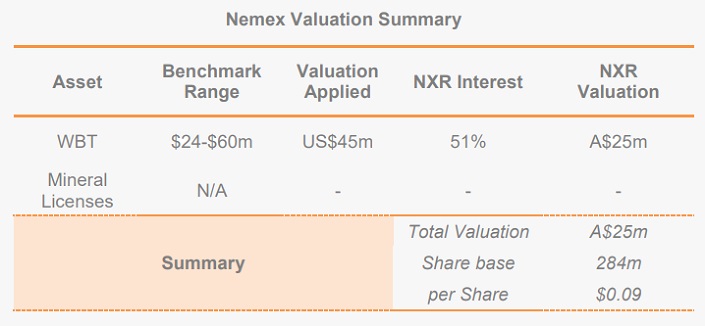
Nemex Resources offers speculative exposure to evolving biometric security markets. We are attracted to the superior performance indicated by lab testing of the CSRA technology, yet recognise that mobile hardware development and independent validation stand ahead as value determinants.
Independent validation to be a major value determinant
On a success case basis, our valuation of $0.09/share represents an 87 per cent premium to recent trade. Whilst upcoming option expiries could influence near term performance, we initiate coverage with a ‘speculative buy’ recommendation in light of the Company’s growth opportunity.
Performance of WBT technology is yet to be appraised outside of a laboratory setting and associated testing hardware remains under development. There is no guarantee independent tests will validate the technology’s performance, or that laboratory performance can be replicated in a commercial context
Performance differentials versus existing biometric recognition technologies may not sufficiently overcome the cost, logistics and reputational hurdles required to stimulate market uptake.
Nemex Resources and WBT are both reliant on external capital to finance operations. There is no guarantee funding will be available to advance development of WBT’s technology. There is a risk future funding initiatives generate greater shareholder dilution than that forecast in our appraisal.
Nemex Resources partial interest in WBT and a lack of synergies with its existing mineral assets may impede the Company’s ability to attract valuations that reflect the potential of its asset base.
The Bulls Say
The Bears Say
Mr. Flint has been in the resources sector for the last 20 years, serving as director or company secretary of Australian Stock Exchange and Toronto Stock Exchange listed companies with projects in Australia, Africa, and Asia. He is a Chartered Accountant
Dr. Turner has more than 20 years of experience working on mineral deposits in Australian, Africa, and Asia. Dr. Turner graduated from the University of Plymouth in 1990 with an Honors Degree in Applied Geology and PhD at the University of Portsmouth (UK) in 1995.
Mr. Jurman is a CPA with more than 10 years’ experience being involved with various public traded companies in Australia serving primarily in company secretarial and financial roles.
Dr. Dyer has a strong history of managing early-stage companies having previously served as Head of Commercialisation, University of Technology, Sydney. She has a PhD in Biochemistry and is a Graduate of the Institute of Company Directors.
Mr. Blair has extensive experience with technology risk and security management having previously served as Chief Technical Officer at NAB and Executive General Manager – Cyber, Identity & Privacy at CBA.
Dr. Sarver is considered a world leader in developing technology for measuring the corneal signal and corneal modelling. Dr. Sarver holds 16 patents in the area of corneal imaging and optical solutions for corneal and contact lens modelling.
Mr Mason is an Optometrist whose experience led to the belief that the surface of the cornea can be used for authenticity identification. He has been an educator at the University Of New South Wales School Of Optometry and is the original inventor of the technology.
Notes
1. Victim Identity Report (Dec 2013). US Department of
2. Identity Fraud Report (2014). Javelin Strategy and
S3 Consortium Pty Ltd (CAR No.433913) is a corporate authorised representative of LeMessurier Securities Pty Ltd (AFSL No. 296877). The information contained in this report is general information only. Any advice is general advice only. Neither your personal objectives, financial situation nor needs have been taken into consideration. Accordingly you should consider how appropriate the advice (if any) is to those objectives, financial situation and needs, before acting on the advice.
Conflict of Interest Notice
S3 Consortium Pty Ltd does and seeks to do business with companies featured in its reports. As a result, investors should be aware that the S3 Consortium may have a conflict of interest that could affect the objectivity of this report. Investors should consider this report as only a single factor in making any investment decision. The publishers of this report also wish to disclose that they may hold this stock in their portfolios and that any decision to purchase this stock should be done so after the purchaser has made their own inquires as to the validity of any information in this report.
Publishers Notice
The information contained in this report is current at the finalised date. The information contained in this report is based on sources reasonably considered to be reliable by S3 Consortium Pty Ltd, and available in the public domain. No “insider information” is ever sourced, disclosed or used by S3 Consortium.